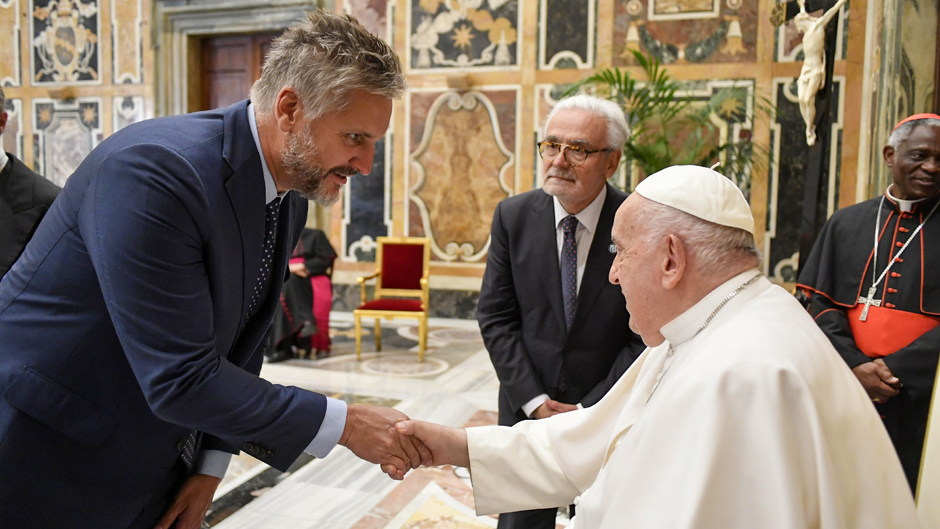“From Climate Crisis to Climate Resilience,” hosted jointly by the Vatican’s Pontifical Academy of Sciences and the Pontifical Academy of Social Sciences, convened mayors, governors, and resilience specialists from around the world. Inspired by Pope Francis’ conviction that “climate change is a global social issue intimately related to the dignity of human life,” the three-day gathering aimed to foster transdisciplinary partnerships and recommend solutions for resilient people and resilient ecosystems.
Michael Berkowitz, executive director of the University of Miami’s Climate Resilience Academy, traveled to Rome as part of a U.S. contingent that included governors from California, Massachusetts, and New York, together with mayors from a range of cities.
“One of the things that’s remarkable about this summit is that the pope, and the Vatican more generally, are interested in climate resilience and frames that as mitigation, adaptation, and societal transformation—that’s an important and helpful nuanced understanding of how communities survive climate shocks,” he said.
Berkowitz highlighted that in focusing the summit on resilience, Pope Francis, born Jorge Mario Bergoglio and the Catholic pontiff since March 2013, marked an important transition in global efforts to safeguard the planet.
“What was most interesting was his emphasis on the social and physical vulnerability intersection—that ‘the effects of climate change are borne by the most vulnerable people.’ That understanding is relatively new and marks the real shift this represents,” Berkowitz said.
Together with Gina McCarthy, a special White House advisor on climate and former Environmental Protection Agency administrator, Berkowitz facilitated a session on governance, which examined programs, policies, practices, laws and regulations that tackle the climate crisis in ways that benefit their communities, families, workers, health, and well-being.
“If we’re going to change the way we live to reduce our vulnerability and enhance our resilience, we need to think about the ‘how’ we do those changes. The governance is in many ways the how,” Berkowitz explained.
“Yet governance is wildly heterogeneous, not just around the world from country to country, but between city or state or provinces there are vastly different authorities that make decisions on spending and other key issues,” he added.
In his workshop, he cited the example shared by Boston Mayor Michelle Wu, who uses her office’s oversight of the city’s public housing budget to promote sustainable living quality.
Wu has a cooperative partner in the state government, and so municipal and state governments enjoy a synergistic relationship, which is critical for effective governance, Berkowitz noted.
“In the places where there’s alignment, that transformational change can happen and places where there’s not, it becomes harder,” Berkowitz said. “The problem is that you can have alignment for a little while, but to make the kind of transformational change necessary you need a generation.”
Berkowitz highlighted that the convening power of the pope, as the leader of the Catholic church with an estimated 1.63 billion followers around the world (Vatican 2022), is “phenomenal.”
“There were lots of incredible people there, the mayors of the world’s major cities. But how does that lead to changes and what does that look like is still under conversation.
“It's up to us to take the protocol and his words of encouragement and to go make that work in our own contexts,” Berkowitz said. “Having the leader of one of the world’s largest religions confer legitimacy on this super important struggle—that’s really empowering.”
In terms of follow-up, Berkowitz suggested that in addition to the climate resilience protocol that was signed, there would be regional gatherings, especially in the Northeast and California—areas strongly represented at the conference—and likely another global conference next year.
One of his “ah-ha” moments was realizing the vast number of academicians in the fields of health economics and health demographics who have spent their careers considering the impact of certain kinds of interventions on the health and well-being of a population.
“Maybe we didn’t call that ‘resilience infrastructure,’ but we can leverage all of that work to drive this agenda forward. That’s very inspiring,” Berkowitz said.
Many at the summit were interested in learning about the Climate Resilience Academy as a mechanism for coordinating interdisciplinary efforts.
“That’s something that both academics and governments alike are wrestling with in their own ways,” he said. “I came back more convinced than ever of the need to connect the innovation that’s happening here at UM to this global community. There are important leading people doing work here, and I want to be able to give that oxygen and exposure so that it helps communities, not just in south Florida but around the world.”
While he’s not Catholic, Berkowitz said that meeting Pope Francis and shaking his hand “felt sacred.”
“He doesn’t speak a lot of English, and I don’t speak a ton of Spanish. But he’s a cool guy, very tuned in to the urgency of the mission and that felt really good,” Berkowitz said.

